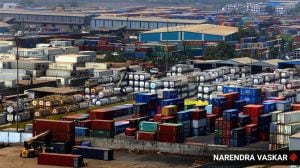Stay updated with the latest - Click here to follow us on Instagram
South Africa ‘will not be bullied,’ Ramaphosa says after Trump attack
While Ramaphosa did not mention Trump directly, he addressed rising global tensions in his annual state of the nation address.
 South African President Cyril Ramaphosa gestures for the national anthem from the steps of Cape Town's city hall before delivering his annual state of the union address, Thursday, Feb. 6, 2025. (AP Photo/Nardus Engelbrecht)
South African President Cyril Ramaphosa gestures for the national anthem from the steps of Cape Town's city hall before delivering his annual state of the union address, Thursday, Feb. 6, 2025. (AP Photo/Nardus Engelbrecht)
Days after US President Donald Trump threatened to cut funding over a land reform act, South African President Cyril Ramaphosa said on Thursday that his country “will not be bullied.”
Trump claimed on Sunday, without providing evidence, that “South Africa is confiscating land and treating certain classes of people very badly,” referring to a new law aimed at addressing racial disparities in land ownership.
While Ramaphosa did not mention Trump directly, he addressed rising global tensions in his annual state of the nation address.
“We are witnessing the rise of nationalism, protectionism, the pursuit of narrow interests and the decline of common cause,” he said at Parliament in Cape Town. “This is the world that we, as a developing economy, must now navigate.”
“But we are not daunted. We will not be deterred. We are a resilient people. We will not be bullied. We will stand together as a united nation and we will speak with one voice in defence of our national interests, our sovereignty and our constitutional democracy.”
What Trump said?
Ramaphosa and his government spent much of the week defending the country’s reputation and legal processes after former US President Donald Trump announced on Truth Social that he would cut all US funding to South Africa.
Trump claimed the country was “confiscating land, and treating certain classes of people VERY BADLY,” without specifying whom he was referring to. He accused the South African government of a “massive Human Rights VIOLATION” that was being ignored by the media, further stating that officials were “doing some terrible things, horrible things,” without providing evidence.
His remarks appeared to reference a law passed last month that allows the government to expropriate land for public use. Ramaphosa’s government has defended the measure, stating it applies only to unused land or land designated for redistribution and includes legal protections to prevent arbitrary seizures.
Ramaphosa’s spokesperson dismissed Trump’s claims, along with criticism from billionaire Elon Musk—who was born in South Africa—as “misinformation.” Musk, who left the country in the late 1980s, has frequently accused the government of being anti-white and suggested the law targets the white minority.
Trump’s statements followed his decision to impose a 90-day freeze on most global aid, putting at risk hundreds of millions of dollars in US funding for South Africa’s HIV/AIDS program, the largest in the world. Ramaphosa called the freeze concerning and said the government was exploring ways to sustain essential services.
US Secretary of State Marco Rubio also criticised South Africa this week, stating he would not attend the upcoming G20 summit in Johannesburg because “South Africa is doing very bad things” such as “using G20 to promote solidarity, equality, and sustainability.”
South Africa assumed the G20 presidency in December, the first African nation to do so, and Ramaphosa has pledged to use the role to advance the interests of Africa and the Global South.
The country has been under a coalition government for about seven months after the African National Congress lost its parliamentary majority last year, forcing it to partner with its main opposition, the Democratic Alliance.
Ramaphosa announced a second wave of reforms to boost economic growth beyond 3%, focusing on revitalising struggling state enterprises like power utility Eskom and logistics firm Transnet, as well as investing in infrastructure. He announced a $50 billion investment over the next three years to upgrade South Africa’s infrastructure, including roads, bridges, dams, seaports, and airports, stating the improvements would “power our economy.”
The central bank projects South Africa’s economy will grow 1.8% this year.
Photos





- 01
- 02
- 03
- 04
- 05

























